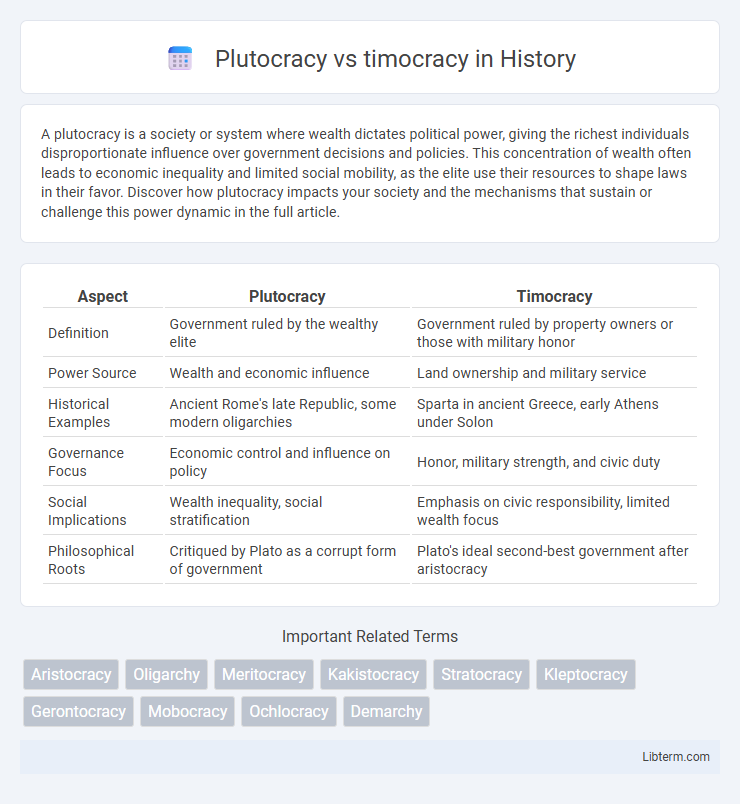A plutocracy is a society or system where wealth dictates political power, giving the richest individuals disproportionate influence over government decisions and policies. This concentration of wealth often leads to economic inequality and limited social mobility, as the elite use their resources to shape laws in their favor. Discover how plutocracy impacts your society and the mechanisms that sustain or challenge this power dynamic in the full article.
Table of Comparison
| Aspect | Plutocracy | Timocracy |
|---|---|---|
| Definition | Government ruled by the wealthy elite | Government ruled by property owners or those with military honor |
| Power Source | Wealth and economic influence | Land ownership and military service |
| Historical Examples | Ancient Rome's late Republic, some modern oligarchies | Sparta in ancient Greece, early Athens under Solon |
| Governance Focus | Economic control and influence on policy | Honor, military strength, and civic duty |
| Social Implications | Wealth inequality, social stratification | Emphasis on civic responsibility, limited wealth focus |
| Philosophical Roots | Critiqued by Plato as a corrupt form of government | Plato's ideal second-best government after aristocracy |
Introduction to Plutocracy and Timocracy
Plutocracy is a form of government where power is concentrated in the hands of the wealthy, often leading to policies that favor economic elites. Timocracy, in contrast, is a political system where honor and property ownership determine the ruling class, emphasizing virtue and military service. Both systems highlight different bases of authority, with plutocracy prioritizing wealth and timocracy emphasizing social status and moral values.
Defining Plutocracy: Rule by the Wealthy
Plutocracy is a system of governance where power is concentrated in the hands of the wealthy elite, often leading to policies that favor economic privileges and asset accumulation. Unlike timocracy, which bases authority on property ownership and military service, plutocracy prioritizes wealth as the primary criterion for political influence and decision-making. This form of rule can result in social inequality and reduced political representation for lower economic classes.
Understanding Timocracy: Power Based on Merit or Honor
Timocracy is a form of government where power is granted based on merit, honor, or military achievement rather than wealth, distinguishing it from plutocracy, which prioritizes economic status. This system values civic virtue and personal contribution to the state, often rewarding citizens who demonstrate loyalty and service. Timocracy emphasizes the role of moral character and competence in leadership, promoting governance driven by honor and duty instead of purely financial influence.
Historical Origins of Plutocracy and Timocracy
Plutocracy originated in ancient Greek and Roman societies where wealth determined political power, notably in the late Roman Republic, as wealthy elites controlled Senate decisions. Timocracy, rooted in classical Athens, emphasized honor and property ownership as criteria for political participation, rewarding military service and property holding rather than sheer wealth. These systems shaped early governance models that contrasted wealth-based rule with honor-based political eligibility.
Key Differences Between Plutocracy and Timocracy
Plutocracy is a system of governance where wealth determines political power, concentrating authority in the hands of the richest individuals, while timocracy bases political influence on property ownership or military service, emphasizing honor and civic duty over wealth alone. Plutocracy often leads to economic inequality as policies favor the wealthy elite, whereas timocracy promotes a more balanced distribution of power tied to tangible contributions like land ownership or defense. The fundamental difference lies in plutocracy's prioritization of monetary wealth versus timocracy's focus on property and honor as criteria for leadership.
Plutocracy in Modern Societies
Plutocracy in modern societies manifests as a system where wealth concentration directly influences political power and decision-making processes, often leading to policies favoring elite economic interests over public welfare. Unlike timocracy, which emphasizes honor or property-based governance, modern plutocracies see corporations and affluent individuals shaping legislation, regulatory frameworks, and election outcomes through extensive lobbying and campaign financing. This concentration of power raises concerns about social inequality, reduced political accountability, and diminished democratic participation in contemporary governance structures.
Timocracy Throughout History
Timocracy, a form of government where political power is based on property ownership or military honor, has appeared in various historical contexts, most notably in ancient Athens during the early stages of its democratic evolution. Unlike plutocracy, where wealth alone determines authority, timocracy rewards individuals who possess both economic resources and a demonstrated commitment to civic duty or military service. This system aimed to balance the influence of wealth with the virtues of honor and responsibility, shaping societies such as Sparta, where military prowess and property ownership were prerequisites for political participation.
Advantages and Disadvantages of Plutocracy
Plutocracy, a system where wealth dictates political power, offers advantages like efficient decision-making driven by economically successful elites who can fund public projects and stabilize markets. However, it risks deepening social inequality, fostering corruption, and marginalizing lower-income populations lacking political representation. Compared to timocracy, which values honor and military service as political qualifications, plutocracy centers power on economic status, potentially undermining civic virtue and equitable governance.
Strengths and Weaknesses of Timocracy
Timocracy, a government system ruled primarily by property owners or those with military honor, emphasizes civic duty, discipline, and order, fostering stability and encouraging a commitment to public service. Its strength lies in promoting a motivated and responsible leadership that values honor and societal contribution, leading to efficient governance focused on collective well-being. However, timocracy's weaknesses include potential exclusion of marginalized groups without property or military status, risk of prioritizing military or property interests above broader democratic needs, and inflexibility in adapting to socio-economic changes.
Plutocracy vs Timocracy: Implications for the Future
Plutocracy, a system where wealth dictates political power, contrasts sharply with timocracy, which prioritizes honor and property ownership as the basis for governance. The implications for the future highlight plutocracy's tendency to exacerbate economic inequality and diminish democratic participation, while timocracy risks promoting elitism based on property rather than merit or broad civic engagement. Understanding these dynamics is crucial for developing political systems that balance wealth influence with active, equitable citizen involvement.
Plutocracy Infographic

 libterm.com
libterm.com